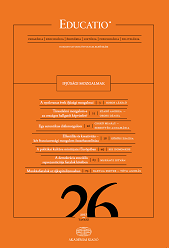Migráns hátterű tanulók iskolai inklúziója a németországi iskolapedagógiai diskurzusban
School Inclusion of Migrant Students in the German Educational Discourse
Author(s): Andrea ÓhidySubject(s): Education, Higher Education , State/Government and Education, Migration Studies, Inclusive Education / Inclusion
Published by: Akadémiai Kiadó
Keywords: inclusive education; school pedagogy; Germany;
Summary/Abstract: In German (education) policy and school pedagogy the concept of “inclusion” was for a long time understood – both in schools and in society – as a concept for the integration of people with disabilities. Inclusion in a broader sense – meaning the appreciation of the diversity of all members of the community to ensure equal opportunities in schools and the wider society – has entered the educational policy and educational discourse only relatively recently. The debate about inclusive school education in Germany is closely linked to the discourse about the PISA-studies – especially regarding the school achievements of students with migrant background: The international comparative PISA studies have shown that the performance levels of students with migrant backgrounds (who usually come from lower social strata) do not reach the desired level. As a result the concept of the Inclusive School was developed (among others) to help these students. This concept seeks to change the schools in order to meet the specific needs of all school children in Germany and to provide equal educational opportunities for all. Inclusion at schools has now become an important guiding principle both in educational policy and in pedagogical discourse. However, school practice is still lagging behind.
Journal: Educatio
- Issue Year: 26/2017
- Issue No: 3
- Page Range: 431-440
- Page Count: 10
- Language: Hungarian

